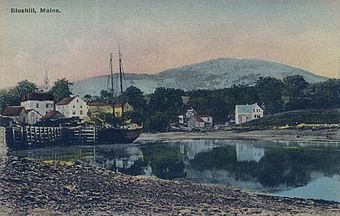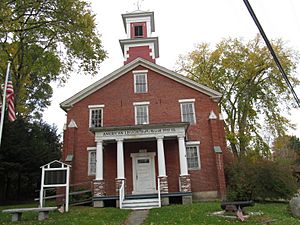Blue Hill Historic District facts for kids
Quick facts for kids |
|
|
Blue Hill Historic District
|
|

c. 1920 postcard view of Blue Hill
|
|
| Lua error in Module:Location_map at line 420: attempt to index field 'wikibase' (a nil value). | |
| Location | ME 15, ME 172, ME 176, and ME 177, Blue Hill, Maine |
|---|---|
| Area | 80 acres (32 ha) |
| Built | 1796 |
| Architect | Multiple |
| Architectural style | Greek Revival, Federal |
| NRHP reference No. | 80000220 |
| Added to NRHP | December 8, 1980 |
The Blue Hill Historic District is a special part of the town of Blue Hill, Maine. It's like a time capsule, showing us what the village looked like long ago. Many of the buildings here were built before 1840. Most of these older buildings were homes. The shops and public buildings were mostly built later, between 1880 and 1940. This historic area was added to the National Register of Historic Places in 1980, which means it's officially recognized as important to history.
Contents
Discovering Blue Hill's Past
The village of Blue Hill is located on the eastern coast of the Blue Hill Peninsula. It sits at the top of Blue Hill Harbor, where two small streams meet the bay. Main Street is the main road through the village, running from east to west. Other important streets like Union Street, Pleasant Street, Parker Point Road, and Ellsworth Street branch off from it.
What Makes Blue Hill Special?
The historic district includes properties along Main Street, from west of High Street to Ellsworth Street. It also covers parts of Union Street and Bucksport Road. This area is about 80 acres big. It contains more than 70 buildings that are important to history.
Oldest Buildings and Schools
Blue Hill village was first settled in 1762. The oldest part that still exists today is the cemetery, which dates back to 1794.
Important Early Homes
Some of the oldest buildings in the district were built around 1800. These include the Daniel Spofford House. Another old building is the Congregational Church Parsonage. This parsonage is connected to the Congregational Church, which was built in 1834. The church has a style called Greek Revival.
The First Schools
The American Legion Hall was built in 1833. It was originally the Blue Hill Academy. This academy was started in 1803 and was the very first school in Hancock County. Later, the academy was replaced by the George Stevens Academy. Its main building, built in 1898, is also in the district. George Stevens' own house, built in 1814 in the Federal style, can still be seen on Union Street.
Shops and Public Buildings
The shops and public buildings in Blue Hill often show two main architectural styles. These are the Second Empire style and the Colonial Revival style.
Grand Commercial Spots
A great example of a commercial building is the Merrill & Hinkley Store. It was built in 1880. This building has three stories and a special roof called a mansard roof. The Odd Fellows Hall, built in 1896, looks similar. The Odd Fellows are a friendly group, like a club.
Town Hall and Library
Blue Hill's Town Hall was designed by a famous Maine architect named George A. Clough. It was built in 1895 and is in the Colonial Revival style. The town's library is also in the Colonial Revival style. It was built more recently, in 1938.


